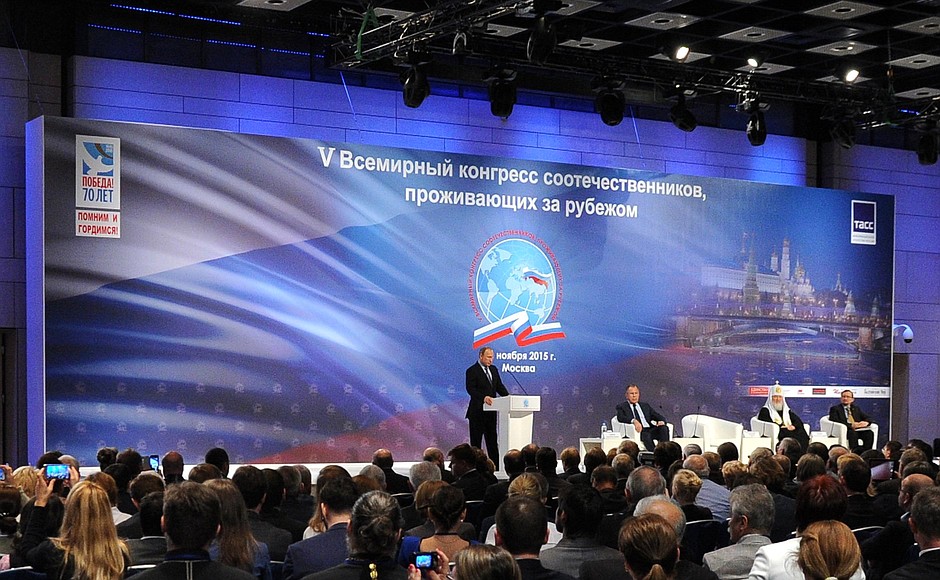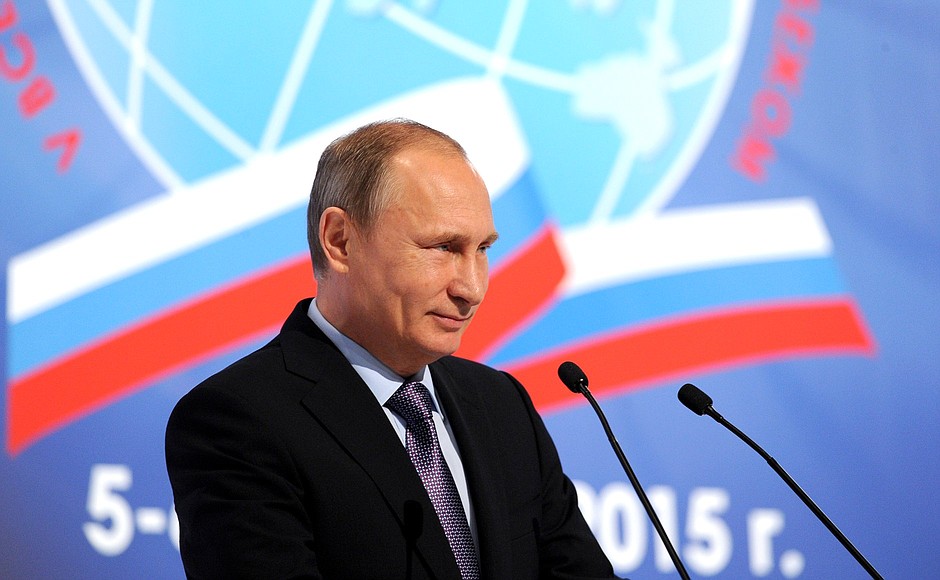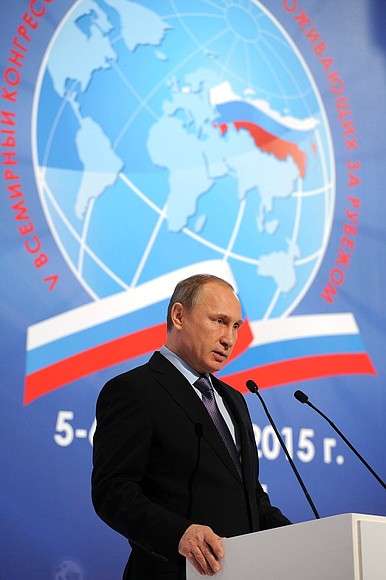The World Congress of Compatriots Living Abroad works to unite Russians abroad, defend their rights and lawful interests, build stronger ties with their historical homeland, and preserve the Russian cultural heritage and language abroad.
The Congress is meeting in Moscow on November 5–6 and is dedicated to the 70th anniversary of Victory in the Great Patriotic War. Taking part are about 400 representatives of Russian communities in 97 countries.
With about 30 million people, the Russian diaspora is one of the four largest in the world.
* * *
President of Russia Vladimir Putin: Good afternoon, friends.
It is a pleasure to greet the participants in the fifth World Congress of Compatriots here in Moscow – the Russian capital that all of you and all of us hold dear.
Yesterday we celebrated our national holiday, the Day of National Unity, a day to remember the heroic pages of our history, the feats performed by our ancestors in the name of this country’s freedom and prosperity. This holiday symbolises the unity of the multi-ethnic people of Russia and our compatriots living abroad.
The make-up of the delegates – and we have people from almost 100 countries here, 97 to be exact – demonstrates the size and diversity of the Russian community abroad. We are sincerely grateful to you, friends, for maintaining your deep internal connection to your historical Motherland, for being proud of Russia, for valuing its culture and its spiritual traditions and for sharing its fate and its current concerns.
We felt your solidarity during the reunification of the Crimea and Sevastopol with Russia. This was a historic event. The decisive support of our compatriots, who expressed their firm desire to be with Russia, to support Russia definitely helped unify Russian society and became an important factor in the consolidation of Russians abroad and the entire Russian community.
Russia highly values your contribution to the preservation and development of the Russian language and to promoting our common cultural values.
We can see that the Russian Orthodox Church and our other traditional religions are playing an ever-greater role in expanding humanitarian ties between our compatriots and Russia. The Russian expatriate community has always united people of different ethnicities and faith. It is important that today you are together resolving common issues and the tasks facing this country.
I would like to thank our compatriots who helped this year to organise and hold events dedicated to the 70th anniversary of the Great Victory over Nazism. My deep gratitude goes to those who honoured the veterans living abroad, who took part in the St George Ribbon and the Immortal Regiment campaigns, who countered attempts to distort the past and reduce the decisive role of the people of the Soviet Union in defeating Nazism.
Friends,
Far-reaching support for our compatriots has always been a priority for us, an area of joint action by the state and by public organisations. We will make every effort to make this work more efficient and less bureaucratic, so that any compatriot could make comments, proposals and suggestions and the feedback to the questions you ask and issues you raise is as quick and substantive as possible – to make the feedback more human.
This approach is the guiding one in the work of the Commission for the Affairs of Compatriots Living Abroad, the Foreign Ministry, the Federal Agency for the Commonwealth of Independent States, Compatriots Living Abroad, and International Humanitarian Cooperation, and our other agencies.
We have a corresponding programme of action for 2015–2017 directed at enhancing work with our compatriots. The Hello, Russia! project has become an important part of that programme. It includes educational trips to historical sites in Russia for winners of competitions on this country’s history and culture. This year about 1,000 people from 47 countries have already taken advantage of this opportunity.
In addition, as envisaged in the programme, in April in Sochi we held the First World Junior Compatriot Games, dedicated to the 70th anniversary of the Great Victory. The Games involved about 600 children from 33 countries.
Russian regions are also implementing interesting and useful projects. They involve businesses, academics, cultural personalities and young people. Thus, the annual Forum of Young Compatriots organised by the St Petersburg administration enjoys great popularity. The government of Tatarstan has already held six World Forums of Tatar Youth. We expect our border areas to become more active in this sphere.
We intend to pay special attention to preserving and developing the Russian language, as I have already said. For centuries, it has been the language of interethnic communication for the numerous ethnic groups of the Eurasian continent, helping them to discover treasures of world culture and to acquaint themselves with advances in science and technology.
We cannot remain indifferent, we cannot help feeling concern when a number of countries are for political reasons consistently destroying the system of education in Russian and are using all sorts of pretexts to hamper the operation of Russian theatres, libraries and cultural centres.
A lot was said at the previous forum of the need to develop education in Russian abroad. We have already worked out a concept for Russian schools abroad. The purpose of such schools is to promote national methods of teaching and education, of developmental teaching, to assist in the study of the Russian language and of subjects that have to do with this country, with Russia, such as this country’s history and geography, the history of its culture and the arts.
It is clear that we need to make more efficient use of extracurricular educational establishments, like Sunday schools at Russian Orthodox churches and educational centres of our other religions to set up courses and groups to study Russian.
We also intend to expand the network of Russian cultural and research centres and to more actively involve national businesses operating abroad in the organisation of Russian schools and cultural centres and communication platforms for the direct communication of people abroad.
We plan to develop the system of grants for the support of cultural and educational projects with the Russkiy Mir Foundation, as well as within the framework of the new federal programme Russian Language adopted in 2015, which has been allocated 6.5 billion rubles.
We will continue supporting the move of Russian expatriates to expand the common communication space. Today Russian-language media are represented in more than 80 countries. While retaining their independent unbiased position and often expressing varying points of view, a vast majority of these are striving to provide accurate and fair coverage of present-day Russia, its history, its achievements and the most important foreign policy developments.
All this definitely serves to strengthen this country’s international authority and influence; it helps destroy the stereotypes and preconceptions of the past and respond to all sorts of propaganda ploys with the truth about this country. We will continue helping Russian-language media, including through the Foundation for Cooperation with Russian-Language Media Abroad, established last autumn.
We believe it is extremely important to create favourable conditions for our young compatriots to study at Russian universities. In 2015, their quota reached 15,000. We will of course continue to assist the branches of our educational establishments in other countries, primarily within the CIS. Quite a few of our universities have opened branches there already, and we will continue this trend.
An important task is to provide reliable protection to our compatriots against all sorts of discrimination and to ensure their lawful rights and freedoms. This includes such key rights as the opportunity to study their national language and to retain their cultural and spiritual traditions.
The Foundation for Supporting and Protecting the Rights of Compatriots Living Abroad offers serious assistance here. Since 2012, it has implemented some 300 projects in 42 countries. About 40,000 people have received tangible help. People who for some reason have found themselves outside Russia should be confident that we will always defend their interests, particularly in complicated, critical situations, such as in Libya, Syria and Yemen.
We will also continue implementing the state programme to assist the voluntary relocation of our compatriots to Russia, as well as corresponding regional programmes operating in 59 regions of the Russian Federation. I would like to note that 367,000 people have relocated to Russia under this programme, about 130,000 of them coming from Ukraine.
We fully understand that help to those who would like to return to Russia needs to be constantly upgraded. We still have many problems here. I am well aware of the practical side of this work – a lot remains to be done. Your feedback is also very important here: your assessment of the problems, proposals on programmes for employment, professional training, housing and help in starting up a business – how to make it more flexible, more in line with the realities of life, directed at specific people and families.
We also plan to expand the use of modern humanitarian technologies. One of them is the creation of a single accessible information resource, where one can receive consultations on a broad range of issues.
Friends,
There is another important area I would like to single out that directly affects the realm of restoring the unity of Russian history, civic accord and overcoming the dramatic division that we have inherited from the past.
I am referring to efforts to return to Russia the heritage of our outstanding compatriots. They were forced to leave Russia for a number of reasons, but they continued serving their Motherland, many of them seeing it as their mission. We value this very highly.
The construction of the first Museum of Russia Abroad will begin in Moscow shortly. It will become part of the Alexander Solzhenitsyn House of Russia Abroad, and its collection and equipment are to make it one of the best museums in Russia.
I would like to note here that in the 20 years of its functioning, the House of Russia Abroad has been gifted about a quarter of a million museum exhibits, archive documents and books. Among them are works by outstanding famous painters, collections of autographs and other documents of our famous writers, politicians, public figures and thinkers. The vast collections of books and periodicals at the House show convincingly that despite complicated, often dramatic circumstances, our people abroad did everything in their power to ensure that the future generations never forgot where they came from.
I would like to stress that all the relics we have been given are stored by the state. Just as their authors and creators wished, this priceless intellectual and cultural heritage will serve Russia, its people and the future generations of this country.
Friends,
There is a lot we still need to do to strengthen business and cultural ties between our compatriots and Russia. We will work to meet our targets and we will meet them.
The main thing is that we remain truly close. I am certain that wherever you are, you historical Motherland will always offer you reliable support and be the subject of your sincere love that inspires people for life.
I would like to thank you for your work, for your attention to the problems of present-day Russia and wish you all the best.
Thank you very much.


